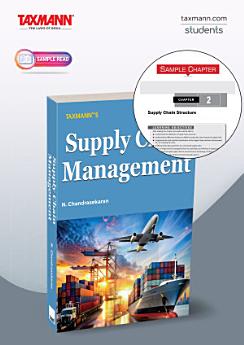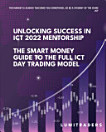Taxmann's Supply Chain Management – A Comprehensive Textbook Integrating Strategic | Tactical | Operational Insights—Enriched with Practical Examples from Modern Global Markets
About this ebook
This book is intended for the following audience:
• Students and Academics – Particularly those pursuing MBA or specialised postgraduate/undergraduate courses in supply chain, operations management, or logistics
• Practitioners and Working Professionals – Managers, consultants, and decision-makers seeking to bolster their knowledge of supply chain applications, best practices, and emerging trends (e.g., digitalisation, analytics, sustainability)
• Researchers and Enthusiasts – Individuals interested in understanding the evolution of supply chain frameworks and exploring new business models driven by technology and globalisation
The Present Publication is the Latest Edition, authored by N. Chandrasekaran, with the following noteworthy features:
• [Comprehensive Coverage] Spans strategy, policy, systems, and operational practices, providing a 360-degree perspective of modern supply chain management
• [Blend of Theory and Practice] Each chapter begins with learning objectives and interlaces conceptual frameworks with practical examples, case discussions, and illustrations
• [Pedagogically Rich] Includes discussion questions, critical thinking questions, and project assignments in every chapter, making it classroom-friendly and ideal for self-study
• [Case Studies and Examples] Presents diverse case studies (Indian and global) highlighting specific supply chain challenges such as transportation scheduling, international coordination, inventory management, sustainability, and digital transformations
• [Focus on Emerging Trends] Integrates themes like digitalisation, AI/analytics, Industry 4.0, sustainability, global logistics challenges, and novel business models, showcasing the evolving nature of supply chain networks
• [Author's Background] Prof. N. Chandrasekaran is a seasoned professional and academic with extensive corporate experience and a deep involvement in teaching, consulting, and research. His insights and industry connections enrich the practicality of the content.
The coverage of the book is as follows:
• Foundational Concepts
o Early chapters introduce supply chain perspectives, structure (efficient vs. responsive), and major drivers (facilities, inventory, transportation, sourcing, pricing, and information)
• Strategic and Tactical Decisions
o In-depth treatment of strategic decision-making in SCM, including network design, transportation choices, and sourcing strategies. Detailed discussions on global supply chain configurations, risk management, and responsiveness
• Operational Practices
o Explores daily execution strategies such as Just-in-Time (JIT), Vendor Managed Inventory (VMI), quality management, and coordination to mitigate the bullwhip effect
• Advanced Topics
o Digitalisation and Analytics – Examines the impact of modern technologies, the adoption of analytics software, and the role of digital twins in reimagining supply chain processes and business models
o Sustainability & CSR – Focuses on green supply chains, ethical sourcing, ESG reporting, circular economies, and how organisations can implement environmentally and socially responsible practices
o Supply Chain Finance – Highlights the importance of synchronising financial flows, covering mechanisms like factoring, reverse factoring, and other forms of trade financing that support supply chain operations
• Excellence and Performance Measurement
o Explains frameworks like balanced scorecards, process-driven metrics, and best practices for continuous improvement, auditing, and benchmarking
• Cases Studies
o The final chapter consolidates case studies illustrating diverse scenarios (e.g., pandemic disruptions, strategic sourcing dilemmas, global logistics hubs, new technologies) to reinforce theory with applied contexts
The structure of the book is as follows:
• Introductory Chapters (1–3) – Lays the groundwork, covering supply chain perspectives, structures (push vs. pull, agile, etc.), and major drivers (facilities, inventory, transportation, sourcing, pricing, information)
• Decision Environment & Strategy (4–7) – Explores external and internal factors shaping supply chain decisions, corporate alignment, third-party logistics, and network configuration models
• Sourcing, Planning & Inventory (8–10) – Discusses procurement processes, tactical planning (demand forecasting, CPFR), sales and operations planning, and inventory management models
• Operational & Coordination Topics (11–13) – Discusses JIT, VMI, supply chain security, obstacles like the bullwhip effect, global supply chain perspectives, and risk management
• Future-ready Supply Chains (14–16) – Addresses digitalisation, big data analytics, new tech-driven business models, sustainability, and supply chain finance solutions
• Performance, Excellence & Organisational Aspects (17–19) – Focuses on assessment frameworks, performance measurement methods (traditional to advanced), and how organisations structure teams and responsibilities
• Case Studies (Chapter 20) – A curated set of cases spanning industries and geographies, offering pragmatic insights into transportation scheduling, sourcing, performance metrics, and risk management
Ratings and reviews
About the author
Prof. Chandrasekaran is an Operations and Supply Chain Strategy Professor at the IFMR Graduate School of Business, Krea University. He is a Certified Supply Chain Management Professional through APICS (American Association of Operations Management, USA) and was instrumental in establishing Centres of Excellence in Logistics and Supply Chain Management. With over twenty‐seven years of corporate experience in India, he has worked across Information Technology, Venture Capital, Industry bodies, and Knowledge Processing, focusing on Strategy, Mergers and Acquisitions, Human Resources, Leadership Development, and Investor Relationship Management.
He has served as an Independent Director at firms specialising in supply chain solutions, distribution management, and healthcare solutions. He also mentors startups in strategy, supply chain, and competitive mapping and continues to serve as an Independent Director with Take Solutions Ltd., a listed company. Throughout his career, Professor Chandrasekaran has provided consulting, research, corporate training, and teaching in Supply Chain Management, Operations Strategy, Logistics Infrastructure, Service Operations, Strategy, and Analytics.
He has published books—individually and jointly—through leading publishers, including Taxmann. Additionally, he has written two volumes titled Incredible Champions Vol. I and II, focusing on leadership in the development sector. The Industry Association has published his work on gender parity, and he has contributed articles to respected academic journals and industry forums. Professor Chandrasekaran also has a record of publishing case studies in prominent repositories, including Ivey Publishing, the Asian Case Research Journal, the Case Centre, and AIMA in India.






